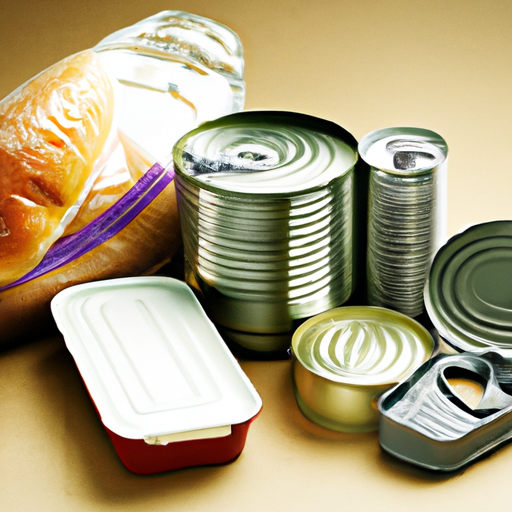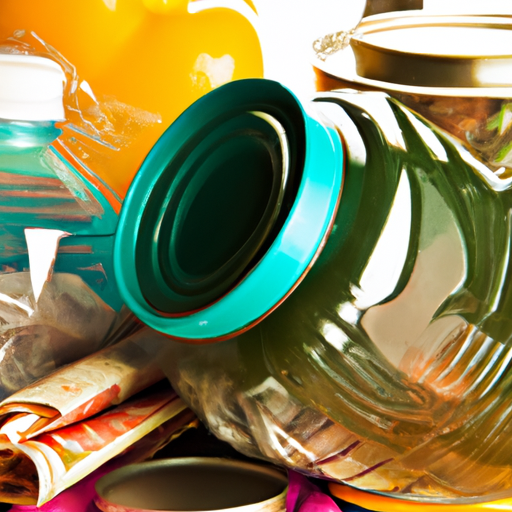So you’ve heard all the talk about prepping and want to start being more prepared, but there’s one small problem – how to start prepping with no money? Well, fear not, because in this article, we’ve got you covered. We’ll show you some creative and practical ways to start prepping without breaking the bank. Whether you’re a beginner or simply looking to be more resourceful, these tips will help you take the first steps toward being prepared for any situation, no matter your financial situation.
Evaluate Your Current Resources
Assess Your Skills and Knowledge
Before diving into the world of prepping, it’s important to take stock of your current skills and knowledge. Evaluate what you already know and identify areas where you can improve. Make a list of skills that could be valuable in a survival situation, such as first aid, navigation, gardening, or foraging.
To enhance your prepping abilities, take advantage of the wide array of resources available. There are plenty of free online courses, YouTube tutorials, and articles that can help you expand your knowledge base. Learning from experts and experienced preppers will provide you with valuable insights and techniques.
Make an Inventory of Existing Supplies and Equipment
Take inventory of the supplies and equipment you already have on hand. Look through your pantry, closets, and garage to identify items that could be useful in an emergency. Take note of any non-perishable food items, water containers, camping gear, flashlights, batteries, and any other tools that could come in handy.
Even if you don’t have a lot of resources at the moment, it’s crucial to know what you have and how it can be used effectively. This inventory will serve as a starting point for your prepping journey and give you a clearer picture of what you still need to acquire.
Develop a Survival Plan
Identify Potential Risks and Hazards
Evaluate the potential risks and hazards in your area. Consider natural disasters, such as hurricanes, earthquakes, floods, or wildfires, as well as any other specific threats that might be relevant to your location. Understanding the risks will help you prioritize your preparations and allocate your limited resources effectively.
Research the history of your region and talk to local authorities or experienced preppers to gather information about past emergencies. This will give you a better idea of what to expect and help you plan accordingly.
Create an Emergency Communication Plan
In any emergency situation, communication is vital. Develop a communication plan to stay in touch with your loved ones and coordinate with others in your community. Identify a designated meeting place, establish a system for checking in with family and friends, and exchange contact information with trusted neighbors.
During a crisis, traditional means of communication may be compromised, so it’s important to have alternative methods. Consider investing in a battery-powered or hand-cranked radio to receive emergency broadcasts, and familiarize yourself with community-based emergency notification systems.
Prioritize Basic Necessities
Ensure Access to Clean Water
Water is an essential resource for survival, so ensuring access to clean water should be a top priority. Start by storing tap water in clean, food-grade containers, such as large jugs or plastic bottles. Aim for at least one gallon of water per person per day.
Additionally, research ways to collect and purify water from natural sources, such as rivers, lakes, or rainwater. You can learn about homemade water filtration methods or consider investing in a portable water filter or purification tablets.
Stockpile Non-perishable Food Items
Building a stockpile of non-perishable food items is crucial for any prepping plan. Look for foods that have a long shelf life and require minimal preparation or refrigeration. Canned goods, dried beans, rice, pasta, and powdered milk are all excellent options.
While you may not be able to afford large quantities of food initially, start small and gradually build up your supply. Take advantage of sales, discounts, and bulk bins at grocery stores to stretch your budget. Don’t forget to rotate your stock and consume the oldest items first to avoid waste.
Secure Shelter and Warmth
In any emergency situation, having a secure shelter and staying warm is essential. Evaluate your current living situation and identify any potential vulnerabilities. If you live in an area prone to extreme weather or natural disasters, consider reinforcing your home or exploring alternative shelter options, such as tents or portable shelters.
Make sure you have enough blankets, sleeping bags, or warm clothing to keep you comfortable in colder temperatures. Additionally, learn about alternative heating sources, such as portable propane heaters or wood-burning stoves, and gather the necessary supplies to implement them safely.
Acquire Essential Skills
Learn First Aid and Basic Medical Skills
Having basic first aid and medical skills can make a significant difference in an emergency. Enroll in a free or low-cost first aid course offered by organizations like the Red Cross or local community centers. You can also find instructional videos and guides online that cover essential medical techniques.
Understanding how to administer CPR, treat wounds, or manage common medical issues will not only help you take care of yourself and your loved ones but could also allow you to assist others in need during a crisis.
Develop Self-defense Techniques
In uncertain times, knowing basic self-defense techniques can provide peace of mind and increase your personal safety. Look for free or low-cost self-defense classes in your area or search for instructional videos online. Learning techniques like basic strikes, situational awareness, or self-defense tactics can empower you to protect yourself and others if necessary.
Remember that self-defense is about avoiding danger whenever possible, so always prioritize safety and awareness before engaging in physical confrontations.
Master Fire Starting and Cooking Skills
Fire is a vital source of warmth, light, and the ability to cook food. Acquiring the skill of fire starting is essential for any prepper. Practice various fire-starting methods, such as using matches, lighters, or alternative methods like flint and steel or magnifying glasses.
Once you have mastered the art of starting a fire, practice cooking simple meals over an open flame or on a camping stove. This skill will allow you to prepare survival food even if your regular cooking appliances are no longer functioning.

Explore Alternative Energy Sources
Harness Solar Power
Harnessing solar power is an excellent way to generate electricity during an emergency. Even with limited resources, you can start by investing in a small portable solar charger for your electronic devices. This will ensure you can stay connected and informed in case of power outages.
If you have the means, consider purchasing a larger solar panel system to generate electricity for essential appliances or lighting. Solar power is a renewable and sustainable energy source that can reduce your dependence on conventional power grids.
Utilize Wind Energy
Wind energy is another alternative energy source that can be harnessed with minimal investment. Wind turbines can generate power by harnessing the wind’s kinetic energy. While setting up a large-scale wind turbine may not be feasible, smaller wind turbines designed for residential use can supplement your electricity needs.
Research the local regulations regarding wind energy and explore the possibility of installing a small wind turbine on your property. It’s important to note that wind energy may be more suitable for rural or open areas with consistent wind patterns.
Build DIY Biomass Stove
A biomass stove is an affordable and sustainable cooking solution that uses organic materials like wood, twigs, or dried leaves as fuel. Building a DIY biomass stove requires minimal tools and materials, making it an accessible project for anyone.
Look for tutorials or instructional videos online that guide you through the process of constructing a biomass stove. Not only will this provide an alternative cooking method during emergencies, but it also reduces your reliance on traditional fuel sources.
Utilize Free or Low-cost Prepping Resources
Research and Utilize Local Community Programs
Many communities offer free or low-cost resources for preparedness. Research local programs, workshops, or seminars that focus on emergency preparedness. These programs often cover a wide range of topics, including first aid, survival skills, and disaster response.
Connect with your local emergency management agency or fire department to inquire about any upcoming events or resources available. By taking advantage of these programs, you can gain valuable knowledge and potentially acquire essential supplies or equipment at a reduced cost.
Join Online Prepping Communities
The internet is a treasure trove of information and resources for preppers. Joining online prepping communities allows you to connect with like-minded individuals, share experiences, and exchange valuable tips and tricks.
Participate in forums, social media groups, or specialized prepping websites to expand your knowledge base and learn from others. These communities often provide a supportive environment where you can ask questions, gain insights, and find encouragement on your prepping journey.
Use Free Prepping Guides and Manuals
Numerous free prepping guides and manuals are available online and in print. These resources cover a wide range of topics, including survival skills, food storage, self-defense, and more. Look for reputable sources like government agencies, non-profit organizations, or experienced preppers.
Take advantage of these comprehensive guides to help you develop your prepping plan, prioritize your investments, and learn valuable skills. Remember to cross-reference information from multiple sources to ensure accuracy and reliability.

Repurpose and Reuse Everyday Items
Turn Household Items Into Survival Tools
In a resource-constrained environment, it’s essential to get creative with the items you already have. Many everyday household items can be repurposed into survival tools. For example, a tin can can be transformed into a makeshift stove or container, a plastic bottle can be converted into a water filter, and a sturdy belt can serve as a makeshift strap or tourniquet.
Think outside the box and explore different ways to utilize common items in your possession. By repurposing what you already have, you can save money and maximize the usefulness of your resources.
Reinforce Clothing and Gear for Durability
When you have limited resources, it’s important to make the most of what you already own. Take the time to reinforce your clothing and gear to ensure durability in challenging conditions. Sew on extra patches or strengthen weak areas on clothing, backpacks, and tents.
Additionally, consider investing in some basic repair supplies, such as needle and thread, adhesives, and reinforcing tape. These simple measures will increase the longevity of your gear and help you avoid additional expenses in the future.
Practice Frugal Prepping
Set a Budget and Stick to It
Prepping doesn’t have to break the bank. To start prepping on a limited budget, it’s crucial to set a budget and stick to it. Determine how much you can allocate towards your prepping supplies and prioritize your purchases accordingly.
Keep an eye out for sales, discounts, or clearance items that align with your needs. Take advantage of coupons and loyalty programs offered by stores to maximize your savings. By planning and budgeting, you can gradually build up your supplies without straining your finances.
Find Low-cost or Free Training Opportunities
Investing in training and acquiring new skills doesn’t have to be expensive. Look for low-cost or free training opportunities in your community, such as workshops, seminars, or classes offered by local organizations, schools, or libraries.
Additionally, don’t underestimate the power of self-directed learning. Utilize free online resources, such as instructional videos, blogs, and forums, to expand your knowledge and gain new skills. With determination and resourcefulness, you can acquire valuable skills without spending a fortune.

Establish a Network of Like-minded Individuals
Connect with Family, Friends, and Neighbors
Building a network of like-minded individuals is invaluable in times of crisis. Start by connecting with your family, friends, and neighbors to discuss emergency preparedness. Share your plans, exchange ideas, and offer each other support.
Collaborating with others helps distribute the burden of preparedness and allows for shared resources and knowledge. It also provides a support system during challenging times, fostering a sense of community and resilience.
Join or Form a Prepping Group in Your Area
If there isn’t already a prepping group in your area, consider forming one yourself. Reach out to local community centers, social media groups, or existing prepper networks to find individuals who share your interest in preparedness.
Being part of a prepping group offers numerous advantages, including shared knowledge, pooled resources, and the opportunity to participate in group training exercises. By joining forces with others, you can enhance your preparedness efforts and create a strong support system in your community.
Focus on Mental and Emotional Preparedness
Develop Resilience and Adaptability
Surviving an emergency goes beyond physical preparedness; mental and emotional resilience are equally important. Develop strategies to cope with stress and build resilience in order to adapt to challenging situations.
Practice stress management techniques such as meditation, deep breathing exercises, or engaging in hobbies that bring you joy. Cultivate a positive mindset and view challenges as opportunities for growth. By focusing on mental and emotional preparedness, you will be better equipped to navigate any crisis that comes your way.
Manage Stress and Anxiety
Preparing for uncertain times can sometimes induce stress and anxiety. It’s essential to manage these emotions effectively to maintain a clear and logical mindset. Find healthy ways to cope with stress, such as regular exercise, spending time in nature, or talking to a supportive friend or family member.
Remember to take breaks and prioritize self-care. Engage in activities that help you relax and unwind. Addressing your mental well-being is just as important as physical preparedness, as it allows you to approach emergencies from a place of calmness and clarity.
So, if you have been wondering how to start prepping with no money, by following these steps and utilizing free or low-cost resources, you can start your prepping journey even with limited financial means. Remember that preparedness is an ongoing process, and every step, no matter how small, brings you closer to being ready for whatever challenges may come your way. Stay proactive, stay informed, and stay prepared.

